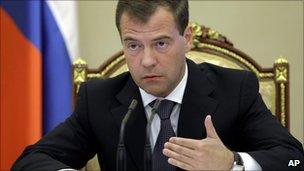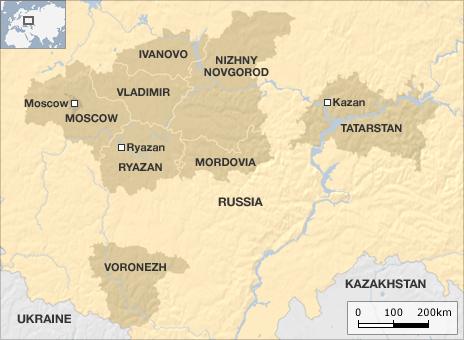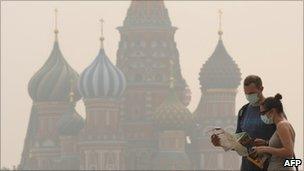Medvedev sacks officers over Russia fire failures
- Published
Richard Galpin: "Twelve houses here have been completely destroyed"
Russia's President Dmitry Medvedev has sacked several top military officials for failing to stop wildfires from destroying a naval base outside Moscow.
He made the announcement after halting his summer holiday to return to Moscow for emergency talks on the wildfires.
Seven regions are under a state of emergency as the fires, which have killed 48 people, continue to rage.
To the east of the capital firefighters are battling blazes near a major nuclear research facility in Sarov.
As a precaution, all nuclear materials have been removed from the site, which is about 400km (250 miles) to the east of Moscow.
"All explosive and radioactive materials have been taken away," Sergei Kiriyenko, head of Russia's nuclear agency, said after attending the emergency meeting of the national security council chaired by Mr Medvedev.
Mr Kiriyenko said there was no risk of a nuclear disaster, and that the primary concern was the threat to expensive equipment and the suspension of important work.
"I can guarantee that even in an extreme situation with squalling winds there is no danger to nuclear security, no threat of radiation, explosions, or environmental consequences," he said.
Public reprimand
Having returned to Moscow from his traditional summer break in the Black Sea resort of Sochi, Mr Medvedev announced the military sackings during a televised appearance at the Kremlin.

Dmitry Medvedev warned that future incidents would also result in sackings
Last Thursday, flames tore through the naval logistics base in Kolomna, 100km south-east of Moscow, destroying office buildings and warehouses and equipment.
Mr Medvedev said commanders of the base were absent when the fire occurred and that it was "unclear where they were".
As a result Mr Medvedev formally reprimanded the head of the Russian navy, Admiral Vladimir Vysotsky, and his deputy Alexander Tatarinov, accusing them of a lack of "professional responsibility" over how the fire was handled.
He also said he had ordered the sacking of a swathe of officers including the head of the Russian navy's logistics division, Sergei Sergeyev, and Nikolai Kuklev, the head of the navy's aviation arm.
Mr Medvedev said many other military sites across Russia were also threatened by the wildfires, and warned that if they were not properly protected by the military there would be more sackings.
"If something similar happens in other places and departments, I will act in the same way, without any pity," Mr Medvedev said.
Thousands of people have lost their homes in 14 regions of Russia over the past few days.
About a fifth of Russia's grain crop has also been destroyed.

On Wednesday morning 520 fires were still burning over an area of 188,525 ha (465,000 acres), Russia's emergency ministry said.
In a 24-hour period, 403 new fires had been recorded and 293 had been extinguished, the ministry added.
Many children are being evacuated from summer camps threatened by fires.
There is expected to be no let up in the heatwave, which has seen record average temperatures, in the next few days, with the Moscow area predicted to hit about 38C (100F) this week.
Peat bog fires outside Moscow have shrouded the capital in smog for several days. Doctors say the elderly and toddlers should wear gauze masks outdoors.
Elena Lezina, an expert at the Moscow state agency that monitors air quality, said pollution in the capital had surged four to 10 times above safe levels on Wednesday morning.
'Negligence'
On Tuesday, Emergencies Minister Sergei Shoigu warned that the situation was dangerously unpredictable.

Moscow doctors recommend that the elderly and toddlers should wear gauze masks outdoors
"In some places it is getting out of control and urgent firefighting manoeuvres are needed," he said.
About 155,000 people, including 124,000 emergency workers, and more than 20,000 units of machinery are currently being used to fight the fires across Russia, the minister said.
Mr Shoigu confirmed that many of the fires were caused by human negligence.
An eyewitness travelling in forested areas east of Moscow over the past week told the BBC she had seen smokers on a train flick smouldering cigarette butts from windows, and motorists likewise discarding them along roads.
The head of the ministry's crisis centre, Vladimir Stepanov, said municipal bodies in central Russia "must mobilise all their forces, not just sit and wait for fire brigades to arrive".
Prosecutors have opened a criminal case against national park officials in the Sverdlovsk region in the Urals, who stand accused of failing to extinguish fires in the area.
- Published4 August 2010
- Published3 August 2010
- Published3 August 2010